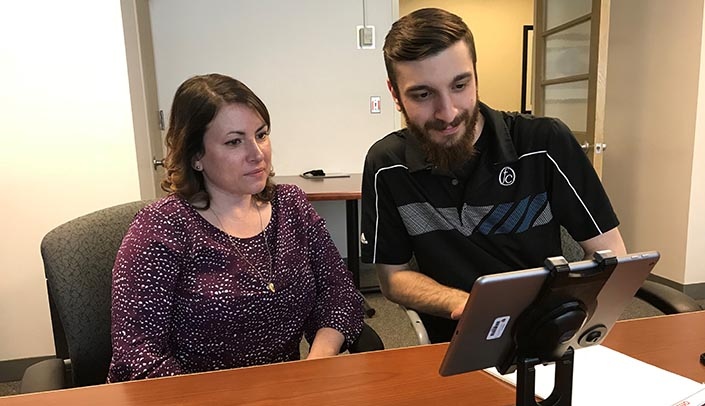The Munroe-Meyer Institute University Center for Excellence in Developmental Disabilities (UCEDD) will take part in a three-state joint employment initiative.
Three of the Midwest UCEDDs — Iowa, Nebraska, and South Dakota — have received a $425,000, two-year grant from the Kessler Foundation to explore the use of telecommunications to provide support for people with intellectual/developmental disabilities (I/DD) in rural areas to achieve and maintain employment.
The New Jersey-based Kessler Foundation is dedicated to developing ways to help people with disabilities overcome obstacles, and lead full and productive lives in their communities. The new employment initiative aims at improving supports in Midwestern rural communities.
The strategy of the pilot program, according to project coordinator Tara Harper, is to provide support through telecommunications to rural job coaches. The service, which will use a board certified behavior analyst to provide support, is open to any of the direct service provider agencies in the state of Nebraska.
The UCEDD has already reached out to the Nebraska Association of Service Providers (NASP) and other area providers to recruit 15 individuals for the first year of the program, said Wayne Stuberg, Ph.D., director of the UCEDD at MMI.
The pilot program, if successful, could be the beginning of a much broader effort, Dr. Stuberg said.
“Other Midwest UCEDDs are interested in this concept,” he said. “Employment is a major theme for the UCEDDS.”
MMI already has the telecommunications infrastructure to put the program in place, Dr. Stuberg added.
“The program will be coaching the job coach, helping to implement strategies to help their client either maintain or find a job,” Harper said. “Our target audience is other Project SEARCH sites.”
“The state of Nebraska has no standardized training for job coaches,” Dr. Stuberg said. “It’s an on-the-job learning situation, so one of the premises of the grant is that if we support the job coaches better, particularly with clients who are having difficulty acclimating to a work environment, the client will have more success and be able to maintain employment.”
The project will target coaches of clients with co-occurring disorders, I/DD along with behavioral disorders and/or mental health challenges. In addition, data from the project may provide information to increase job-coach retention, Harper said.
“Job coach retention rates are very low,” she said. “So, will this training and support actually help retain them?”
The program will start recruiting job coaches and clients in mid-March. Jordan Lill and Mark Shriver, Ph.D., will be the psychologists providing the consultation with job coaches, and employment services liaison Ian Froemming also providing some consultation. Dr. Stuberg and Harper hope the program will prove self-sustainable after the two-year grant period ends.
“This is a pilot study, so we just want to see if this is an effective means to provide helpful consultation,” Harper said.
